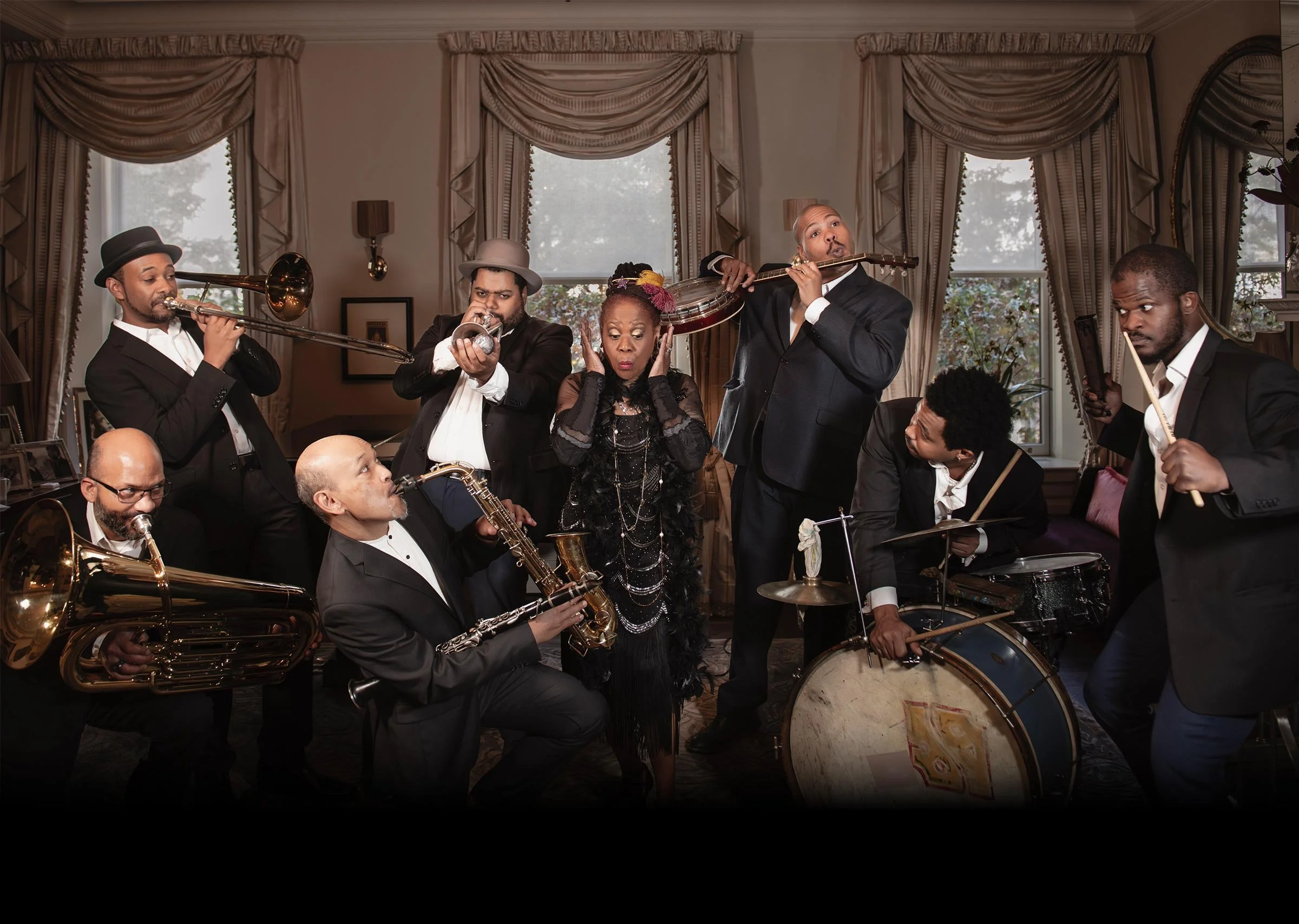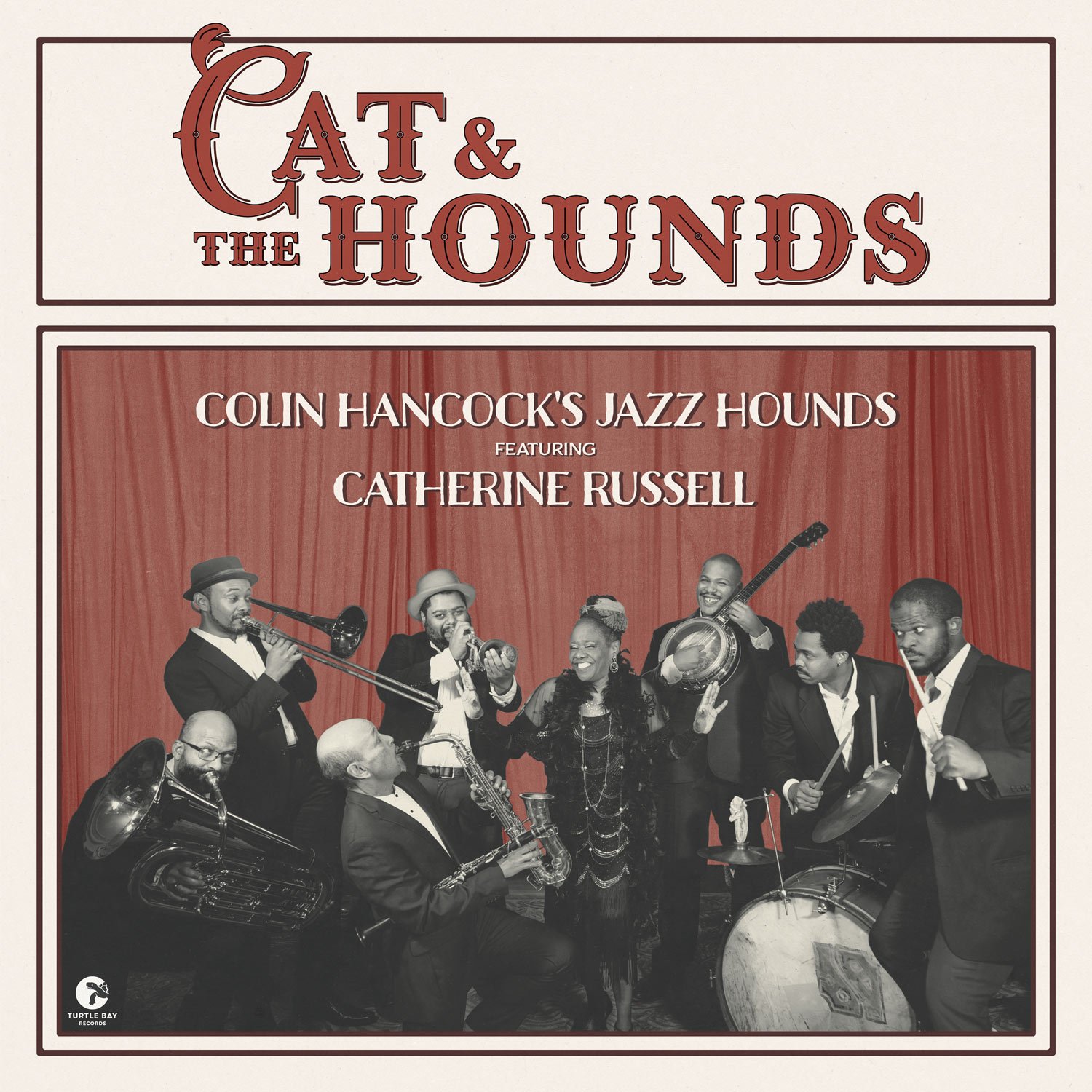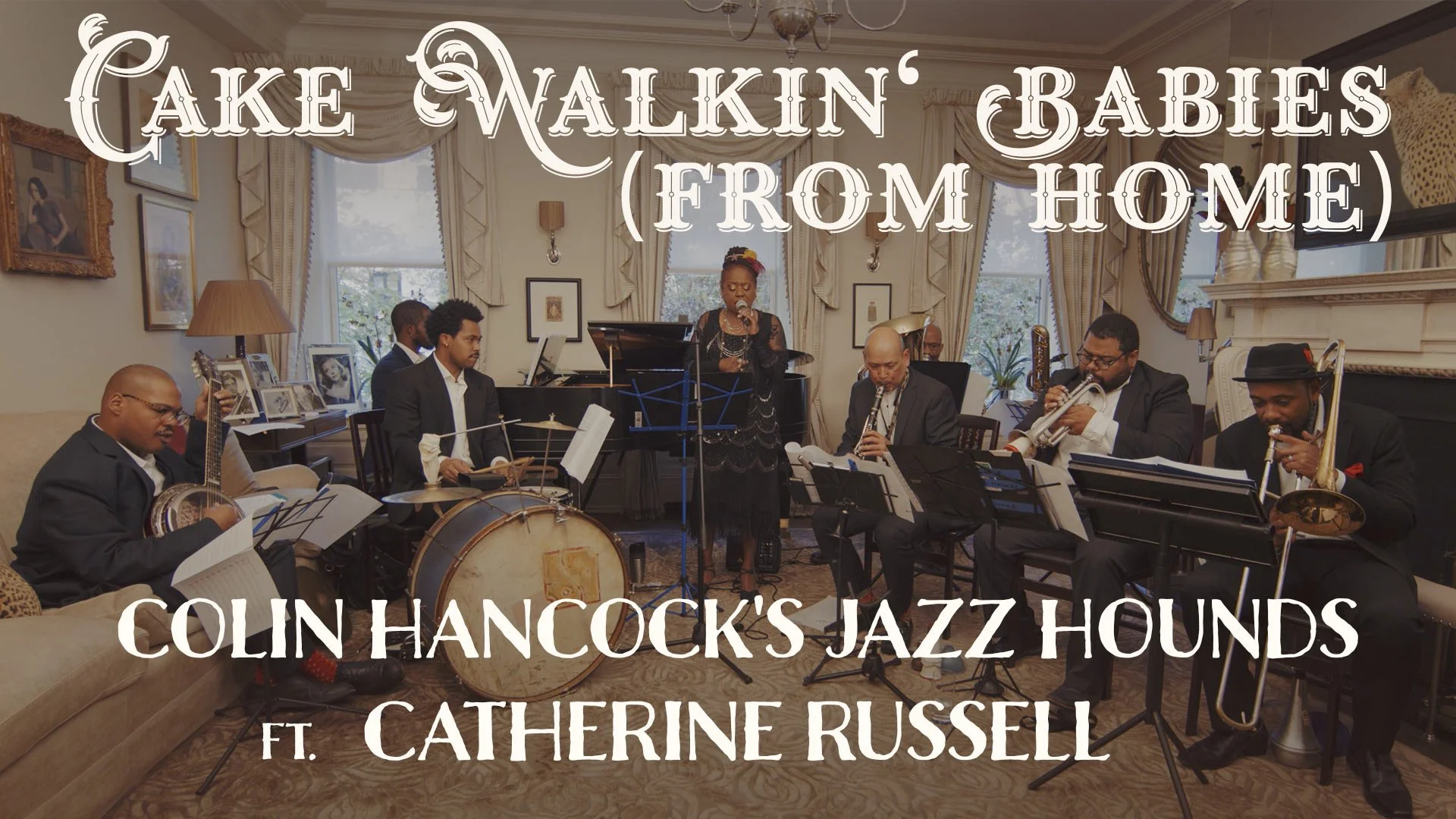
For your Grammy® Consideration
Best Jazz Vocal Album: Cat & the Hounds
Best Jazz Performance: Elevator Papa, Switchboard Mama
Best Arrangement, Instruments and Vocals: Cake Walkin' Babies (From Home)
Best Album Notes: Cat & the Hounds

1. Panama Limited Blues (J. Mayo Williams) 3:20
2. Cake Walkin’ Babies (From Home) (Clarence Williams, Chris Smith, Henry Troy) 2:50
3. Telephoning the Blues (Victoria Spivey) 2:59
4. You’ve Got Everything a Sweet Mama Needs But Me (Lemuel Fowler) 3:19
5. Gypsy Blues (Intro: Serenade Blues) (Noble Sissle, Eubie Blake) 2:59
6. Elevator Papa, Switchboard Mama (Andy Razaf, James P. Johnson) 4:29
7. West Indies Blues (Edgar Dowell, Clarence Williams, Spencer Williams) 2:36
8. Everybody Mess Around (Perry Bradford) 3:20
9. Goin’ Crazy With the Blues (Andy Razaf, J. C. Johnson) 2:56
10. Crazy Blues (Perry Bradford) 3:13
11. Carolina Shout (James P. Johnson) 2:49
12. Sweet Man (Maceo Pinkard) 2:40

Afro-Romani cornetist, saxophonist, historian, and producer Colin Hancock’s Jazz Hounds are proud to announce — a bold new album that revives the spirit of early 1920s Black jazz and blues with historical insight and contemporary urgency. Featuring three-time GRAMMY-nominated vocalist Catherine Russell, the band also includes trombonist Dion Tucker, multi-reedist Evan Christopher, multi-instrumentalist and vocalist Jerron Paxton, pianist Jon Thomas, drummer Ahmad Johnson, and tubist Kerry Lewis. Together, they reimagine the sound of a “lost” Creole territory band — one that never recorded, but left a profound cultural imprint.
Rooted in rare 1920s recordings and deep archival research, the Jazz Hounds reinterpret both obscure and canonical material — not as re-enactment, but as restoration. Named in part for Johnny Dunn’s pioneering Jazz Hounds, the group channels each member’s heritage into vivid performances that honor the complex, cosmopolitan roots of Black popular music in the early recording age.
The album’s origins trace back to George Wein’s vision for a “History of Jazz” showcase at the 2020 Newport Jazz Festival, intended to spotlight foundational styles and a new generation of Black traditionalists. Wein enlisted Vince Giordano of Nighthawks fame, who tapped Colin Hancock to lead the project. When the pandemic canceled the festival — and Wein passed soon after — the concept was shelved.
That changed in 2023 at a Brooklyn housewarming party, where Hancock performed with ragtime legend Terry Waldo and was joined on a few tunes by Catherine Russell. Conversations that night with Russell and her husband and manager, Paul Kahn, rekindled the idea — and Cat & the Hounds was born: a living tribute to the music’s roots and resonance.
“Early jazz wasn’t just the work of untrained horn players,” Kahn and Hancock write in their liner notes. “And early blues didn’t come solely from rural guitarists.” Instead, the music was shaped by violinists, conservatory-trained pianists, and artists rooted in classical, Caribbean, and African American traditions — all blending improvisation, syncopation, spirituals, and ragtime into a vibrant, evolving form.
“At the same time,” they add, “the early recording industry reduced this rich musical tapestry to the more marketable term ‘blues.’” It’s a reductive legacy that Cat & the Hounds seeks to correct. Emotionally full-bodied and historically illuminating, the album restores depth to a too-often flattened history.
The journey begins with “Panama Limited Blues,” named for the Illinois Central train connecting New Orleans to Chicago. The tune reflects the path of pianist Luis Russell — Catherine Russell’s father — from Panama to the American South and eventually to King Oliver’s Chicago band. First recorded in 1926 with Luis Russell on piano, it’s reimagined here with Jerron Paxton’s train-whistle harmonica and vivid instrumental interplay inspired by Russell’s early collaborators.
The album continues with “Cake Walkin’ Babies From Home,” inspired by Bessie Smith’s simmering 1925 version recorded with Fletcher Henderson’s Hot Six, followed by “Telephoning the Blues,” a 1929 Luis Russell–Victoria Spivey collaboration, revisited here with a fiery trombone solo by Dion Tucker. Next comes Edna Hicks’ underrecognized 1923 side “You’ve Got Everything a Sweet Mama Needs But Me,” and “Gypsy Blues” from Shuffle Along — the landmark 1921 musical by Noble Sissle and Eubie Blake.
A risqué vaudeville duet, “Elevator Papa, Switchboard Mama” was made famous by Butterbeans and Susie in 1930. Featuring Andy Razaf’s clever double-entendre lyrics and James P. Johnson’s music, the tune finds new life as Russell and Paxton trade comic lines, with Hancock’s cornet evoking the spirit of Johnny Dunn and Louis Metcalf.
“West Indies Blues,” first recorded in 1923 by Armand J. Piron’s Orchestra, reflects the Caribbean influence in early Black dance music. The elder Russell studied piano with Piron’s pianist Steve Lewis, and this version features Evan Christopher’s lyrical obbligato and a bass saxophone cameo by special guest Vince Giordano.
Alberta Hunter’s spirited “Everybody Mess Around,” penned by Perry Bradford, gets a raucous, full-band update, with Russell leading the charge and Kerry Lewis delivering a playful tuba solo — a nod to Hunter’s often-overlooked legacy as a pioneering blues voice.
Mamie Smith’s lesser-known 1926 Victor side “Goin’ Crazy with the Blues” receives high-velocity treatment. Russell’s electrifying vocal ignites the band, with Tucker’s moaning trombone and Hancock’s cornet fueling the drama alongside a searing horn section.
The final stretch brings deep homage and joyful flair. Smith’s genre-defining 1920 hit “Crazy Blues” returns in a darker key, with Russell revisiting the song she first recorded for Boardwalk Empire, buoyed by soaring clarinet and a James P. Johnson–inspired solo from Jon Thomas. Thomas then takes center stage again on Johnson’s stride piano masterpiece “Carolina Shout,” blending solo and ensemble versions with crackling banjo breaks from Paxton.
The album closes with “Sweet Man,” recorded by Ethel Waters in 1925 with Alex Jackson’s band. Hancock channels original cornetist Harry Tate’s muted lines, Russell simmers on the vocal, and Paxton offers a tender six-string banjo tribute to Johnny St. Cyr.
With that, the Jazz Hounds bring this thrilling, edifying journey through Black musical history full circle — proving this music isn’t merely the stuff of dusty archives, but still vividly alive a century later.
CATHERINE RUSSELL - Vocals
COLIN HANCOCK - Cornet, C-melody sax
DION TUCKER - Trombone
EVAN CHRISTOPHER - Clarinet, Soprano Sax, Alto Sax
JERRON PAXTON - Banjo, Guitar, Vocals, Harmonica
JON THOMAS - Piano
KERRY LEWIS - Tuba
AHMAD JOHNSON - Drums
Special Guest: VINCE GIORDANO - Bass Sax (4, 7)
TIM LARSEN
JAZZ VIEWS
“Cat & The Hounds is one of the most exciting jazz albums of the year..."
PRESTON FRAZIER
SLANG OF AGES
“...a look back at great music while also creating something new, which deserves a broad audience and begs for repeated listening.”
JIM HYNES
GLIDE MAGAZINE
“Hancock,Russell and the Jazz Hounds have filled a musical gap and then some…”
WILL FRIEDWALD
THE NEW YORK SUN
“...one of the most remarkable releases of the year if not the decade…”
REBECCA KAPLAN
BROADWAY WORLD
“A bold new album that revives the spirit of early 1920s Black jazz and blues with historical insight and contemporary urgency.”
AMOS PERRINE
NO DEPRESSION
".…the most sumptuous playing and singing you’ll hear all year.”
“...the perfect band, a septet led by cornetist Hancock that features bluesman Jerron (“Blind Boy”) Paxton - both of whom are steeped in their respective genres...Russell is second to none in traversing the many styles of jazz singing…the most sumptuous playing and singing you’ll hear all year.”







